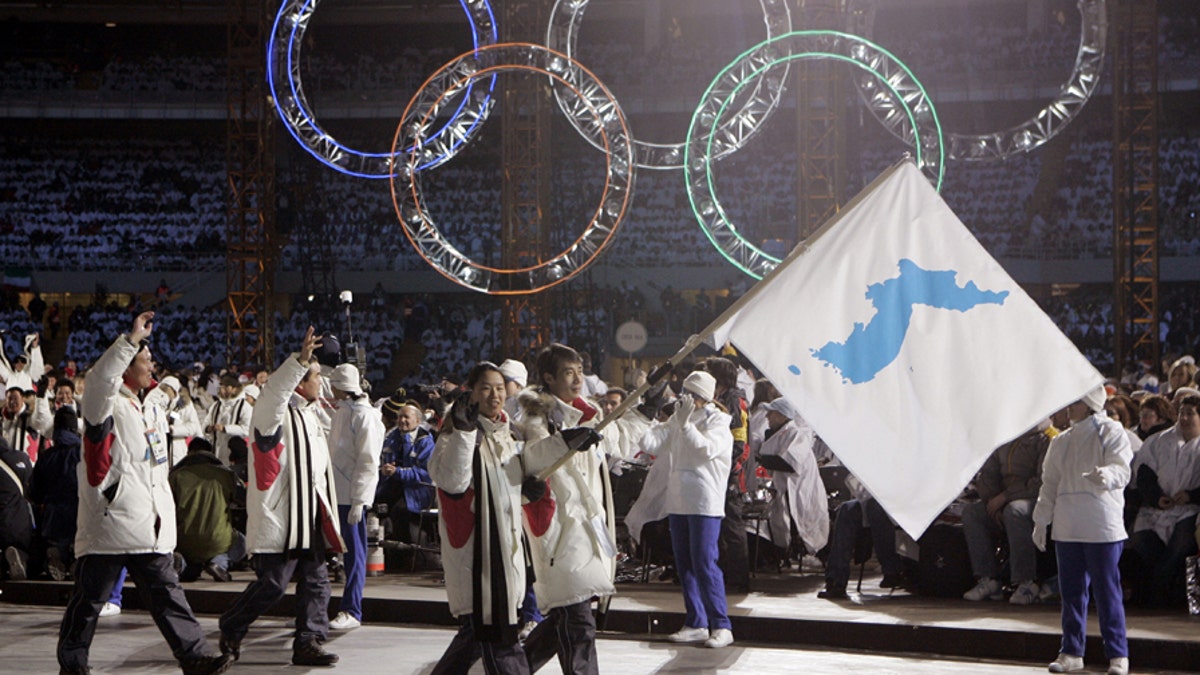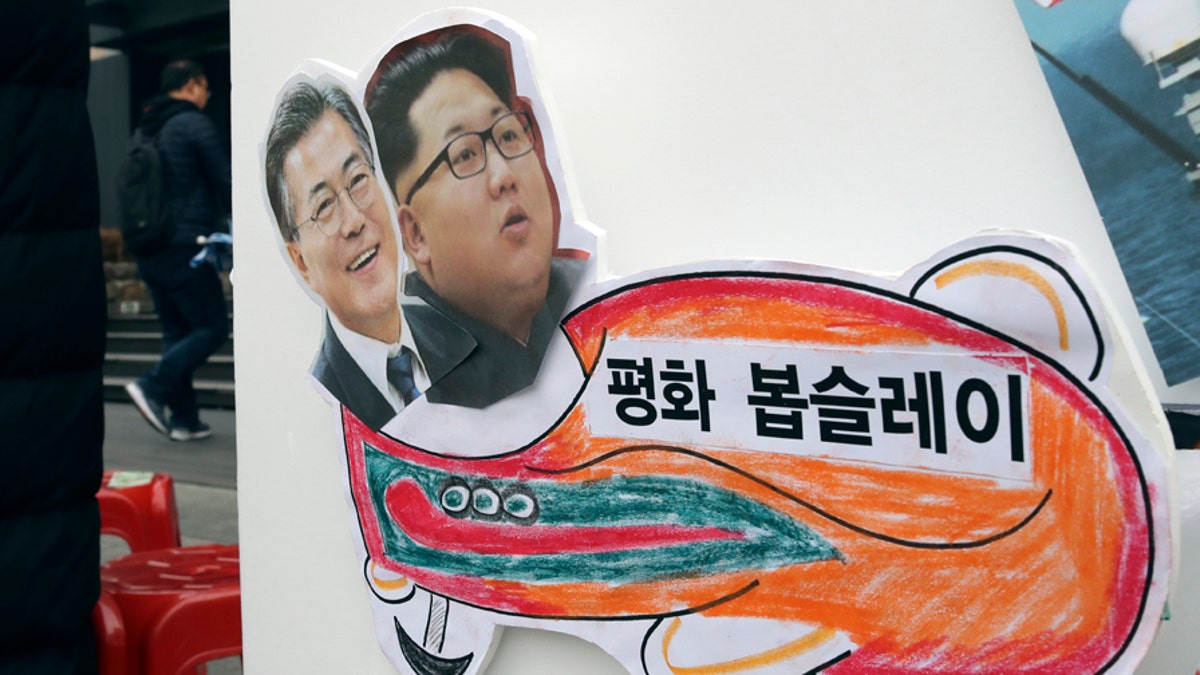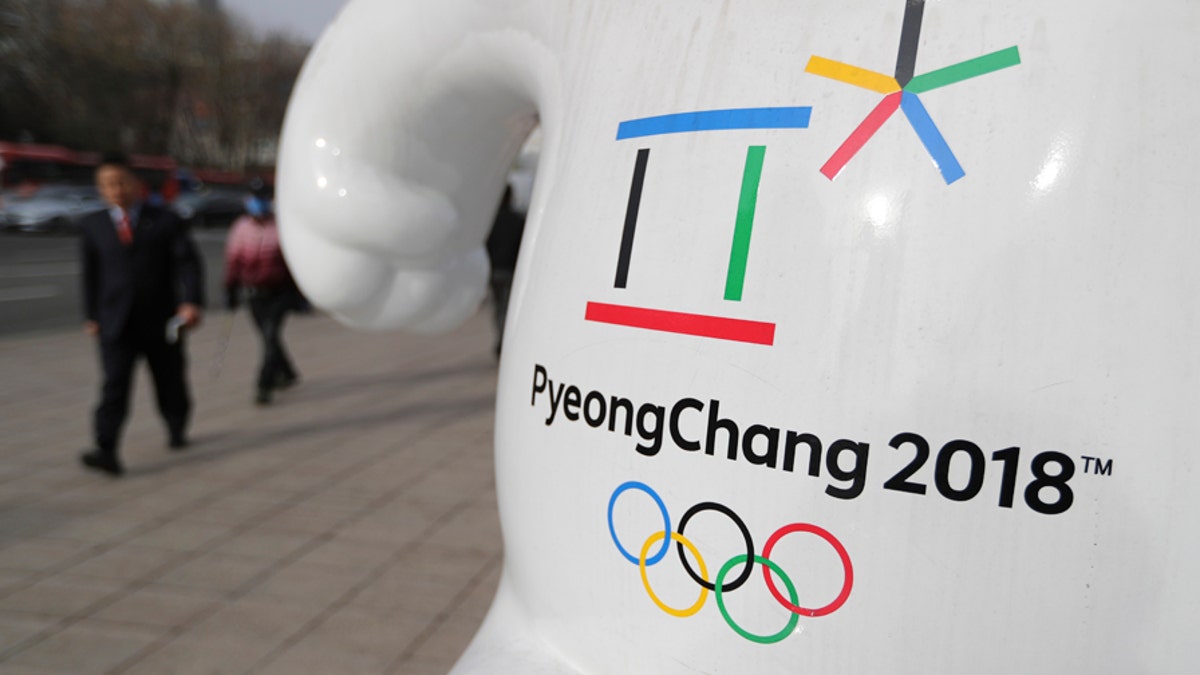
FILE - In this Feb. 10, 2006, file photo, Korea's flag-bearers Bora Lee and Jong-In Lee, carrying a unification flag lead their teams into the stadium during the 2006 Winter Olympics opening ceremony in Turin, Italy. When athletes of the rival Koreas walked together behind a single flag for the first time since their 1945 division at the start of the 2000 Sydney Olympics, it was a highly emotional event that came on the wave of reconciliation mood following their leaders first-ever summit talks. Eighteen years later, now, the Koreas are pushing to produce a similar drama during the upcoming Pyeongchang Olympics. But they havent generated as much enthusiastic supports as they had both at home and abroad. (AP Photo/Amy Sancetta, File)
The International Olympic Committee on Saturday agreed to allow 22 North Korean athletes to compete in the upcoming Winter Olympic Games in PyeongChang, South Korea amid a thaw in tensions between the two nations. Both Korean teams will march together in the opening ceremony.
The IOC announcement comes two days after representatives from the two Koreas agreed on five sports that North Korean athletes would participate in the upcoming games.
During a brief press conference, IOC President Thomas Bach offered his “sincere thanks to the governments of North and South Korea.”
"Such an agreement would have seemed impossible only a few weeks ago," he added.
The North Korean athletes will compete in pair figure skating, alpine skiing, short track speed skating and cross-country skiing.
Additionally, a total of 12 North Korean women's hockey players will join their South Korea neighbors in a united roster playing in special uniforms with a Korean song as their anthem.
North Korea's delegation will also include 24 coaches and officials.

In this Tuesday, Jan. 16, 2018, photo, pictures of South Korean President Moon Jae-in, left, and North Korean leader Kim Jong Un are seen on a sign during a rally for a peaceful Winter Olympics in Seoul, South Korea. North Korea plans to send a spotlight-stealing delegation to next months Winter Olympics in the South Korean county of Pyeongchang. The letters read "Peace bobsleigh." (AP Photo/Lee Jin-man) (The Associated Press)
The agreement between the two countries was reached during recent high level talks that were spurred by North Korean strongman Kim Jong Un’s statement on New Year’s day that he was willing to send a delegation to the Feb. 5-29 PyeongChang Games.
The most symbolic sporting aspect of the deal is a women's hockey team — the first time that the two Koreas will have joined together in Olympic events. They will play under the acronym "COR" and hear the song "Arirang" as a pre-game anthem. The roster will include 12 players from the north and 23 from the south. However, to maintain fairness for opponents, only 22 can suit up for each game. At least three must be North Korean, the IOC said.
"The Olympic Games show us what the world could look like, if we were all guided by the Olympic spirit of respect and understanding," Bach said.
The meeting on Saturday, which was attended by delegations from both Koreas and the PyeongChang 2018 Organizing Committee, also finalized protocols related to North Korea's participation, such as the country's flag, uniform and anthem.

The official emblem of the 2018 Pyeongchang Olympic Winter Games is seen in downtown Seoul, South Korea, Thursday, Jan. 18, 2018. When athletes of the rival Koreas walked together behind a single flag for the first time since their 1945 division at the start of the 2000 Sydney Olympics, it was a highly emotional event that came on the wave of reconciliation mood following their leaders first-ever summit talks. Eighteen years later, now, the Koreas are pushing to produce a similar drama during the upcoming Pyeongchang Olympics. But they havent generated as much enthusiastic supports as they had both at home and abroad. (AP Photo/Lee Jin-man)
The only North Korean athletes to have actually qualified for an Olympic spot are the figure skating pair of Ryom Tae-ok and Kim Ju-sik. The skaters qualified for a spot in the games last September, but missed the late October deadline set by the IOC to confirm their participation.
The neighboring countries have also agreed to field a joint women’s hockey team to compete next month, with North Korea sending TK players to play on the squad.
This is not the first time the two Koreas have competed together under a joint flag – they joined up in the past at the world table tennis championships and world under-20 soccer championships – but this is the first Olympic Games in which they will field a team together since their 1945 division.
The countries have previously marched together in the opening ceremonies – first at the 2000 Summer Olympic Games in Sydney and most recently in 2006 during the Winter Olympics opening ceremony in Turin, Italy.
The unification plan has not generated much enthusiasm among South Koreans, with many conservatives asking why their athletes cannot carry their own national flag during the first Winter Olympics on their soil.
"We are turning the Pyeongchang Olympics that we've got into the Pyongyang Olympics," said Hong Joon-pyo, leader of South Korea's main conservative opposition party, referring to North Korea's capital. "We are dancing to the tune of (North Korean leader) Kim Jong Un's disguised peace offensive."
Many critics are skeptical of Kim's abrupt overture, believing he may be trying to use the Olympics to weaken U.S.-led international pressure and sanctions toughened after North Korea's sixth and biggest nuclear test and a series of missile launches last year.
Public surveys show most South Koreans support the North's participation in the Olympics, a chance to create a tentative thaw in the Koreas' long-strained relations. But a poll released Thursday suggests that half of South Koreans oppose a joint flag.
The survey by the private polling group Realmeter indicates how much South Koreans' view of their northern neighbor has changed because of its expanding nuclear and missile programs since the two countries' athletes marched together at sporting events during the era of detente in the 2000s.
Despite conservative skepticism, South Korea's government led by liberal President Moon Jae-in says it hopes the Olympics will provide the Koreas with a chance to improve their frosty relations. Government officials say the South Korean national flag will appear at the start of the opening ceremony, regardless of the joint march, and appear again whenever South Korean athletes win medals.
North Korean Olympic participation "will serve as a chance to warm solidly frozen South-North ties," Moon said during a visit with South Korean Olympic athletes on Wednesday. "But if we march together or field a single team, I think that can be a further step in developing South-North relations."
The Associated Press contributed to this report.
